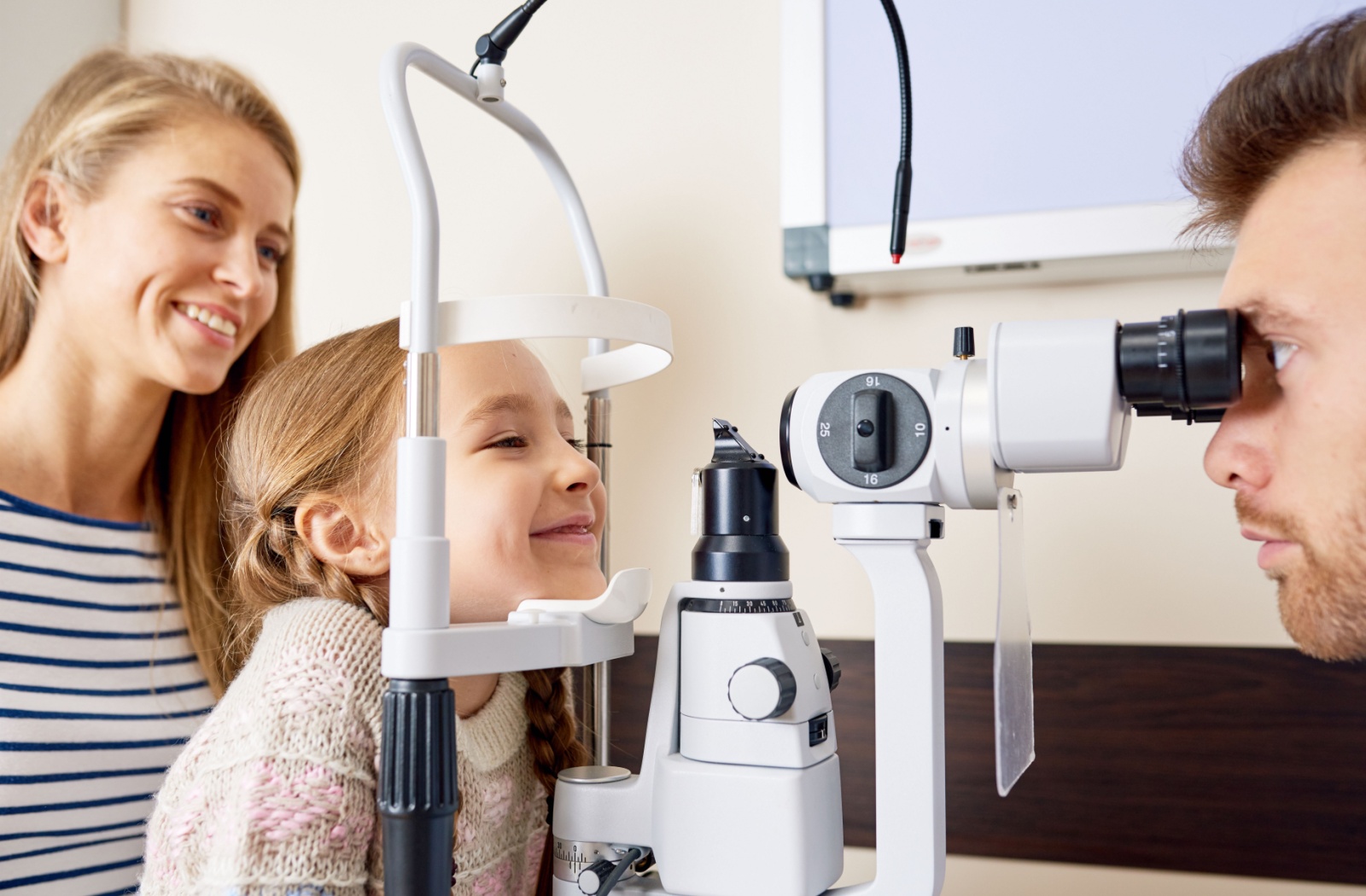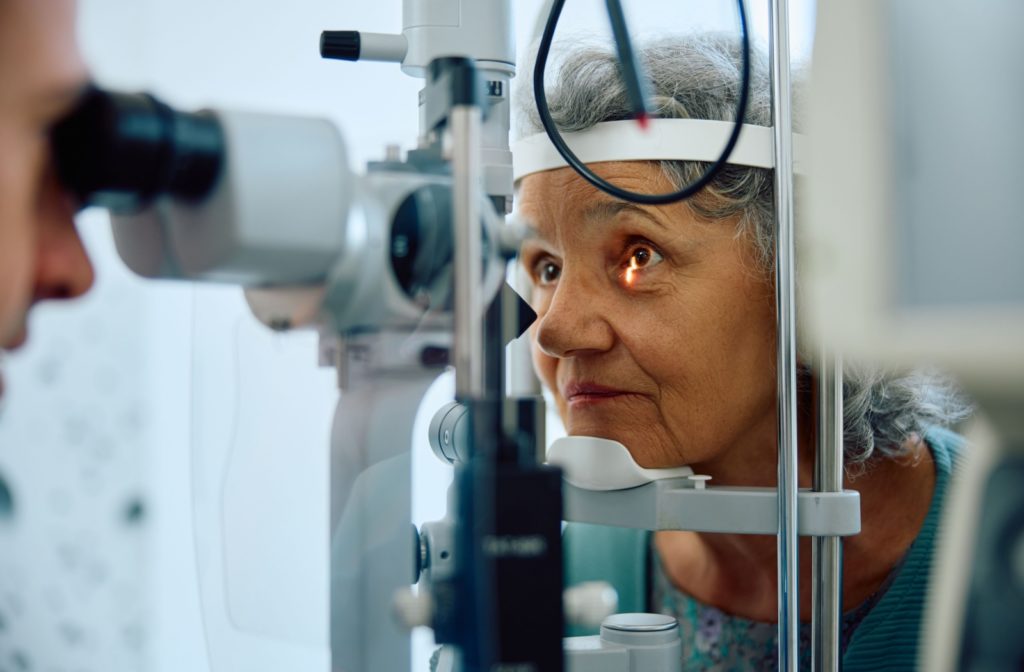Maintaining good eye health is important for people of all ages—it doesn’t matter if you’re currently wearing glasses or think you have perfect eye health. Regular eye exams help monitor and maintain eye health, diagnose problems early, and help your vision be the best it can be. That’s why frequency is important!
Children and seniors should get eye exams annually, while adults should get their eyes checked at least every 2 years. This is only a general guideline, and many factors can affect how often you walk through our doors.
The Importance of Regular Eye Exams
You’ve heard it before: regular eye exams play a crucial role in maintaining eye health and overall well-being. We say it because it’s true!
First, regular eye check-ups allow your optometrist to detect eye conditions such as glaucoma and diabetic retinopathy early. Many eye diseases just like them don’t have notable symptoms in their early stages, meaning by the time you notice them, the damage may already be done. With early detection comes early treatment, which can help prevent irreversible vision loss.
This quick intervention can have long-lasting effects on kids, whose eyes are changing rapidly. For example, myopia (nearsightedness) is a very common visual condition, affecting about 30% of the population currently—and that number is on the rise. This condition is progressive, meaning it worsens before it stabilizes around age 20. While we can’t reverse it, we can slow it with myopia management. This is just like applying the brakes. The earlier we start slowing it, the clearer their vision can be.
Additionally, if you have an existing eye condition, regular exams help monitor the progress and effectiveness of treatment. Undiagnosed vision problems can significantly impact daily activities like reading, driving, and working. Lastly, eye exams can even reveal signs of other health issues, such as high blood pressure and diabetes. Talk about full body care!
Recommended Eye Exam Frequency by Age Group
The eye exam schedule is broadly divided by age, allowing people to get care based on their changing needs. Here are the Canadian Association of Optometrists recommended guidelines for different age groups:
Children (0–18 years)
Newborns should have their eyes checked by a pediatrician during initial health check-ups. This can be a very important time for your little ones, as their ocular structures are still developing.
- Infants should then have their first comprehensive eye exam between 6–12 months to detect any congenital issues.
- At 2–5 years, preschoolers should undergo 1 more eye exam to identify early signs of vision problems.
- Children 6–19 years old should have 1 eye exam a year to monitor vision changes that could impact their learning and development.
Adults (19–64 years)
Even as we grow older, our eyes are still continuing to change. Adults should have an eye exam at least every 2 years if they don’t have any symptoms or vision problems. Those with vision correction needs, diabetes, or other risk factors should follow their optometrist’s recommendations.
Seniors (65+ years)
Seniors have a higher risk of age-related conditions such as cataracts, glaucoma, and macular degeneration. Everyone 65+ should have 1 eye exam a year to help maintain vision and overall quality of life.

Factors Influencing Eye Exam Frequency
Other than age, several factors can affect how often you should get your eyes checked. These include:
- Family history: If you have a family history of eye conditions such as glaucoma or macular degeneration, you may need more frequent eye exams to diagnose any potential issues early.
- Existing eye conditions: Those with existing eye conditions like myopia, hyperopia, astigmatism, or presbyopia should follow their optometrist’s recommendations for exam frequency.
- General health: Conditions like diabetes can have a significant impact on eye health, necessitating more frequent eye exams to monitor for complications such as diabetic retinopathy.
This means even adults between 19–64 years can benefit from yearly eye exams!
Signs You Might Need an Eye Exam Between Regular Visits
While keeping to a schedule is important, that doesn’t mean you should ignore potential problems in your family simply because you’re not due for a check-up. Some symptoms and changes in vision that should prompt an immediate visit to your optometrist, include:
- Sudden changes in vision: Your optometrist should evaluate any sudden loss of vision, blurriness, or double vision promptly, as they can indicate anything from a non-threatening hiccup to a serious problem. Many times the only way to know is to see your eye doctor.
- Frequent headaches: Persistent headaches can be a sign of vision problems or eye strain.
- Eye pain or discomfort: Any pain, redness, or discomfort in the eyes should be checked by a professional.
- Difficulty seeing at night: Trouble seeing in low light conditions can be the first sign of many serious eye diseases.
- Flashes or floaters: Seeing flashes of light or an increase in floaters can be a sign of retinal issues that need immediate attention.
Get Your Eye Health on Schedule
If you’re due for an eye exam or experiencing any symptoms that may require immediate attention, don’t hesitate to contact us at Village Optical. Our team of experienced professionals is here to help you maintain your vision and eye health.
Book your eye exam and take charge of your eye health today!



